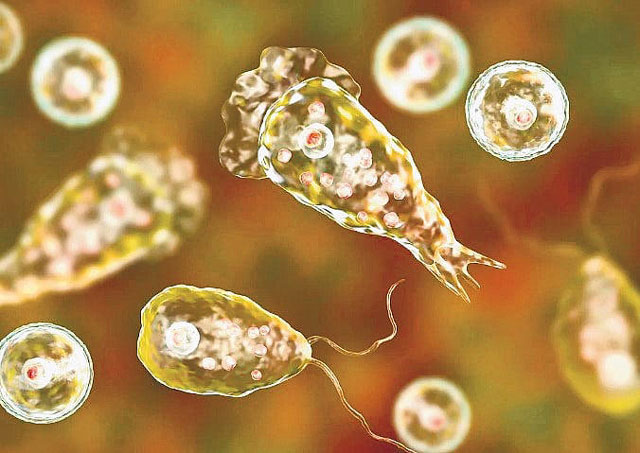Daijiworld Media Network - Thiruvananthapuram
Thiruvananthapuram, Sep 14: An 18-year-old patient undergoing treatment at the Government Medical College Hospital in Thiruvananthapuram has tested positive for Acanthamoeba, a free-living amoeba that causes the rare but potentially fatal condition known as amoebic meningoencephalitis. Health officials confirmed on Sunday that the youth, who is currently stable, is being treated with miltefosine — the frontline medication used in such infections.
The teen first sought medical help on August 18 at a private hospital in Kanjiramkulam, complaining of fever, headache, and dizziness. As his condition deteriorated, he was transferred to facilities in Neyyatinkara and then to a private hospital in the city before being admitted to the medical college. Although initial cerebrospinal fluid (CSF) tests were inconclusive, PCR analysis conducted in Coimbatore confirmed the presence of Acanthamoeba.

Investigations revealed a likely source of infection: a swimming session at Akkulam Tourism Village on August 16, where the youth and six friends swam and dived without nose clips — a known risk factor for such infections. None of the other swimmers have shown symptoms so far, but authorities are probing other possible water exposures as well.
This is not an isolated case. Thiruvananthapuram currently has nine active cases of amoebic meningoencephalitis, with two fatalities reported earlier this year — both in patients with pre-existing conditions. Last year, the district recorded 20 cases, including several cluster outbreaks.
In response, the District Tourism Promotion Council (DTPC) has shut down the Akkulam pool for cleaning and maintenance. Water samples have been collected and sent for PCR testing, with results expected within two days. Officials have confirmed the pool will not reopen until it passes safety clearance.
Kerala has a history of infections caused by various free-living amoebae. Between 2019 and 2023, Naegleria fowleri — another deadly amoeba — was detected in multiple districts. In 2024, cases involving Naegleria fowleri, Vermamoeba vermicularis, and Acanthamoeba were confirmed across Thiruvananthapuram, Malappuram, Kannur, Kollam, Kozhikode, Palakkad, and Thrissur. Some infections were linked not to recreational water but to pipe water exposure.
In light of these findings, public health authorities are calling for stricter surveillance and disinfection of both recreational and domestic water sources, warning that free-living amoebae are widespread in the environment and thrive in warm, stagnant water.